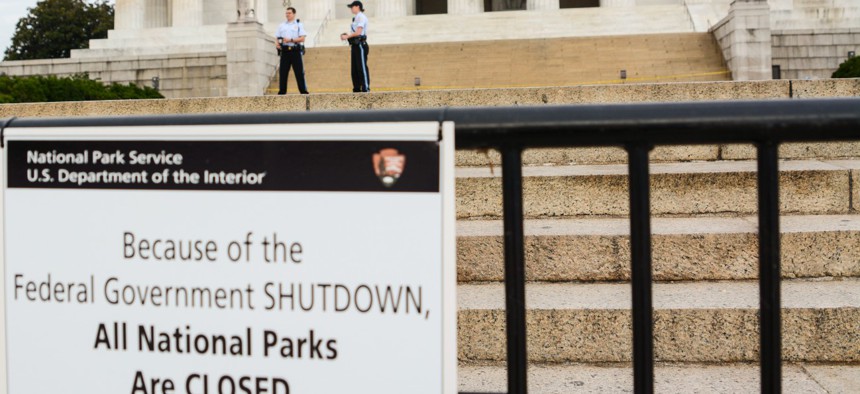The shutdown threat would be off the table, under newly proposed legislation

The Lincoln Memorial is closed during the fall 2013 shutdown. Scott Kirkwood/NPCA via Flickr
A bill from Virginia Democrats would automatically trigger a continuing resolution when there is a lapse in appropriations and restrict the Senate’s ability to consider non-spending legislation until funding is figured out.
A pair of Virginia Democrats on Wednesday introduced a new bill aimed at preventing federal agencies from shutting down and restricting the legislation Congress can consider during lapses in appropriations.
The End Shutdowns Act, introduced by Sen. Tim Kaine and Rep. Don Beyer, would create a mechanism by which, if full-year appropriations bills are not enacted by the start of a new fiscal year on Oct. 1, federal agencies would be funded automatically as if Congress had passed a continuing resolution. Funding levels for an agency or program would reflect the amount they received in the previous fiscal year, whether that was authorized by appropriations legislation or a previous continuing resolution.
The bill also aims to ensure Congress still moves promptly to end lapses in appropriations by restricting the types of legislation that the Senate may take up during a shutdown. Any appropriations or continuing resolution bill considered during a lapse in appropriations would automatically be considered “emergency” legislation, allowing it to be considered on an expedited basis.
“On or after October 1 of each fiscal year, if continuing appropriations for such fiscal year are in effect [under the provisions of this bill] for any program, project or activity . . . it shall not be in order in the Senate to move to proceed to any matter, including any privileged matter, other than a measure making regular or continuing appropriations for such fiscal year,” the bill states.
Over the last decade, lapses in appropriations or the threat of them have become more prevalent and frequent. Following the 35-day partial government shutdown that began at the end of 2018, lawmakers enacted a law automatically granting federal workers—those furloughed and those deemed essential—back pay once a shutdown ends.
During Congress’ August recess last month, some House conservatives signaled that they would withhold support for any deal to keep the government open unless the agreement withheld funding for the Justice Department’s multiple criminal indictments against former President Trump over his alleged mishandling of classified documents and efforts to overturn the results of the 2020 presidential election. However, during a lapse in appropriations, those efforts would continue, as criminal litigation is considered an essential activity and the federal judiciary typically remains open during a government shutdown.
“Government shutdowns have disastrous consequences for federal employees and government contractors and slow down critical government services that millions of Americans rely on like getting replacement Social Security cards and food inspections,” Kaine said in a statement. “But politicians continue to use or threaten to use government shutdowns as a negotiating tactic. This is unacceptable, which is why I’m reintroducing my bill to prevent government shutdowns.”
Beyer added: “Intentionally shuttering the government of the most powerful country on earth is foolish, weakening and embarrassing America on the world stage. It also does lasting damage to our economy and inflicts harrowing uncertainty on millions of civil servants and their families, many of whom live far from Washington. Congress should permanently take the threat of a government shutdown off the table.”






